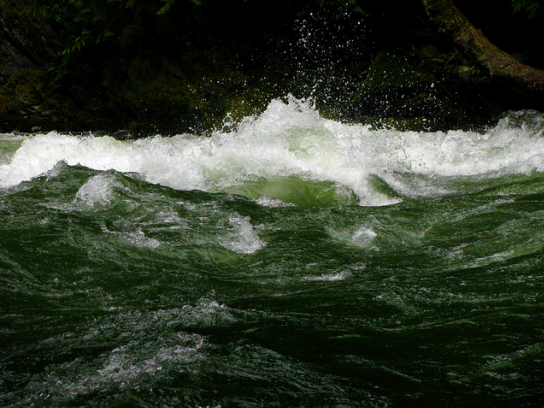Last week, residents of Chilliwack found themselves embroiled in a battle for their water.
Chilliwack has a reputation for pure, fresh water: in 1999, the city was voted the best drinking water in Canada by the Canadian Water Resource Association. This was the last year the contest ran, making Chilliwack the reigning champion of Canadian water.
However, in a visit to Chilliwack earlier this month, Dr. Marcus Lem of Fraser Health Authority told the city it would have to start chlorinating its water.
After what Chilliwack residents are calling an unprofessional approach to the issue, Dr. Lem was taken off the issue, and Dr. Paul Van Buynder (also of Fraser Health Authority) stepped in.
Dr. Van Buynder was not available for comment, but released a statement to media last week.
“While the residents of Chilliwack are rightly proud of their water supply and no-one should be concerned about drinking the water, Fraser Health is working with the Chilliwack Council to address the risk associated with isolated incursions of bacteria into the system,” he wrote. “Chlorination as an added safety support is part of these discussions.”
Chilliwack’s Director of Public Works Glen MacPherson says there were three separate occasions in which e. coli was detected in the water between 2009 and 2012. These three events were the source of Lem’s concern.
“E. coli on a laboratory test result is stated as count per 100 millilitres,” MacPherson explains. “The lowest count you can get, that can be detected, is a count of one … in all three cases, the test results came back with a count of one.”
MacPherson went on to explain that, although overall risk is low, it’s only a matter of time until Chilliwack becomes chlorinated.
“Since the first incident in 2009, Fraser Health have been inferring to staff here that some day [they] are probably going to be looking at making the city chlorinate the water,” he continues. “But we’ve never known when that would be – whether that would be in the next year or in 10 years. And it just so happens that they decided 2013 was the year.”
The news that Chilliwack may be facing chlorination struck a chord with many Chilliwack residents, including Jake and Kim Reimer. When they heard the news, the young parents and web designers decided to put their skills to work, quickly building www.chilliwackwater.com.
The website has become both a source of information about the water system in Chilliwack and a place for residents to lend their name to a petition.
Kim Reimer says she takes issue with chlorination on several levels – because of the taste, but also due to health concerns. When chlorine comes into contact with biological material, she explains, it reacts to kill and disinfect it, creating disinfection by-products.
“Fraser Health is saying that because our water is so pure, there is nothing for [the chlorine] to react with,” Reimer says. “But then the issue still stands – what happens when you shower in it? What happens when you drink it? Our mouths are full of bacteria and our skin is covered in it. There’s stuff for it to react with.”
The petition currently has a little under 4000 signatures, a number that grows every day. Part of the problem, the Reimers say, was how Lem handled the situation.
“The line that really infuriated a lot of people was, ‘As a responsible parent, I wouldn’t let my child drink this water.’ Which, by exclusion, is saying every parent in Chilliwack is irresponsible,” Kim Reimer says.
“We didn’t have to create a response to this petition,” Jake Reimer adds. “We simply had to provide a forum for people to react on. That’s all we did. We just facilitated what people already wanted to talk about.”
When e. coli is detected in the system, MacPherson says, the city acts immediately to flush the system and institute temporary chlorination where necessary.
Despite the public outcry, he continues, if Fraser Health decides system-wide chlorination is necessary, the Drinking Water Protection Act gives them the authority to see it through in their role as Water Protection Officer in the lower mainland.
“They can make any change to the drinking water that they deem necessary,” MacPherson explains. “The only stipulation that kind of ties their hands a little bit is that the act requires that full consultation with the water supplier is carried out.”
Fraser Health is currently in the consultation phase, which includes talking to Chilliwack Council, and will also involve a public forum this week.
Even if they decide to go ahead with chlorination, MacPherson says, it could be a while before the changes are actually instituted.
“I think they’re going to be reasonable and they’ll ask the city to decide itself how much time it needs for this,” he explains. “It’s a lot of money – we’ve estimated [it will cost] $1.5 million to put it in place, and we can’t pull that out of thin air.”
Meanwhile, the Reimers encourage residents to do their own research, look at the information compiled by the city, and come to the public forum prepared with the facts.
“I think a lot of people at this point have gotten fairly well-informed and I think for a lot of people this meeting is more about making a show of it,” Jake Reimer says, “ – making sure a lot of people get out there and show their opposition to this, make it clear that the city is not happy with the way Fraser Health has dealt with this particular issue.”
The meeting, scheduled 7 p.m. for Tuesday, February 26, will be held at Chilliwack Alliance Church on Young street in Chilliwack.



